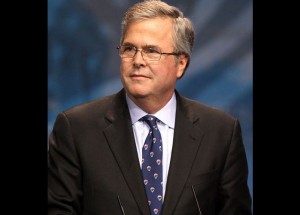
WASHINGTON – Today, the Human Rights Campaign called on former Gov. Jeb Bush to clarify recent comments supporting new so-called “religious freedom” protections in states across the country that would put LGBT Americans and other minority groups at risk of discrimination.
At an appearance in Atlanta Thursday, Bush was asked about a deplorable bill that recently passed the Georgia State Senate that would allow people to use their religion to challenge or opt out of various laws—including local laws in Atlanta and other cities—that protect LGBT people and other minorities from discrimination in employment, housing, and public accommodations. That proposal would allow businesses to refuse service to same-sex couples, a paramedic to refuse to provide life-saving services to an LGBT person, or a school counselor to refuse services to an LGBT teenager.
Bush expressed support for new “protections” that would come from legislation like Georgia’s that would legalize discrimination under the guise of so-called religious liberty. Currently, there are 70 bills pending in 23 states that are considering dangerous religious refusal legislation like it.
“It’s deeply disappointing that Governor Bush won’t stand up against legislation that authorizes discrimination,” said JoDee Winterhof, HRC’s Vice President for Policy and Political Affairs. “We don’t need dangerous new legislation that not only allows discrimination against LGBT people, but goes even further and opens the door to allowing women and members of other religious faiths to be targeted and discriminated against as well. Governor Bush needs to clarify and explain why he thinks it’s acceptable to expose LGBT people and so many others to the risk of discrimination.”
The harm these bills may cause doesn’t end with the LGBT community. Under several proposed pieces of legislation—many of which are modeled on a failed attempt in Arizona last year that drew condemnation from businesses, faith communities, and elected officials in both parties—an evangelical police officer could feel empowered to refuse to patrol a Jewish street festival; a city clerk could shirk the law and refuse a marriage license to an interracial couple, a divorcee seeking to remarry, or a lesbian couple; an EMT could claim the law is on his side after refusing service to a dying transgender person in the street; and the enforcement of other key sections of civil rights law could be dramatically undermined. In many cases, these extreme bills will permit anyone to sue a government entity or business executing a government policy over their personal religious beliefs.
Such legislation would critically undermine the enforcement of state non-discrimination protections, and passing them will do serious harm to the business climate of these states—exposing small business owners to a wave of lawsuits, putting jobs at risk, and making major corporations think twice about investing in states that previously had pro-business reputations.











